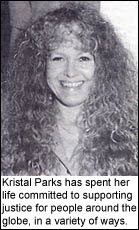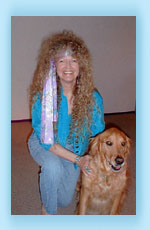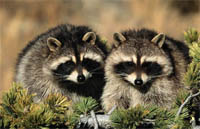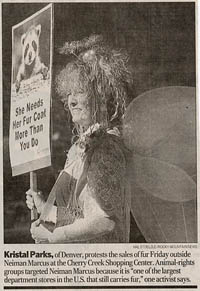



Re-Enchanting the World through Compassionate Action
Kristal Parks is an activist -- of a different order. She has shared
life and struggles with Mayan Indians in Guatemala, Hmong refugees in
Thailand and women in American prisons. She resisted nuclear weapons
proliferation for 10 years, was arrested often and imprisoned in solitary
confinement.
Now she also has the challenging adventure of being an advocate for
her disabled brother.
But her deepest passion is as a voice for animals, especially elephants.
She aspires to live a cruelty free lifestyle as a vegan.
Kristal Is Passionately Supporting Immigrants Held in ICE Detention & Helping to Unite Families


From The
Washington Park Profile, a monthly newspaper:
As
Activist Or Clown, She Carries a Message of Hope
by Susan Dugan
 Long-time
Denver activist Kristal Parks sits down and points to a photograph of
a young Guatemalan girl. "My activism has always had a child component
to it," she explains. Take for example this child, Alejandra. Besides
actions that included 10 years resisting nuclear weapons production at
Rocky Flats, Parks spent time in Guatemala in the 1980s providing 24-hour
protection for the girl and her activist mother to help stem the tide
of "disappearing" Guatemalan citizens.
Long-time
Denver activist Kristal Parks sits down and points to a photograph of
a young Guatemalan girl. "My activism has always had a child component
to it," she explains. Take for example this child, Alejandra. Besides
actions that included 10 years resisting nuclear weapons production at
Rocky Flats, Parks spent time in Guatemala in the 1980s providing 24-hour
protection for the girl and her activist mother to help stem the tide
of "disappearing" Guatemalan citizens.
"They had a civil war for a very long time, and people were just
disappearing off the street," she says. "So the local people
founded an organization to try to deal with the problem, but it's against
the law to organize like that. So the leaders of the organization (people
like Alejandra's mother) were in really great danger of losing their lives."
Parks and other Peace Brigade International volunteers intervened by creating
a visible international presence. "My job was to walk on the side
of the sidewalk next to the street because when you disappear, somebody
just comes around a corner and grabs you." To protect her charges
she'd sit on the outside at restaurant tables and behind them in movie
theatres. Each day she'd accompany Alejandra to school and wait for her
at the front gate.
Did she fear for her life? "Yes," she says. "But my feeling
was if anybody tried to harm her, they were going to have to kill me.
Because it wasn't right. And it was an incredible opportunity to use my
class, my education, my nationality, my American looks to save another
person's life."
The daughter of an American diplomat, Parks, who moved to Mexico at seven
and to Spain at 12, considers herself culturally bilingual. "When I went
back to Guatemala, it was like going home because the cultures are so
similar," she says. She also credits her early experience in Mexico with
igniting her revolutionary spirit."I became very aware of poverty and
prejudice and injustice at a young age, she says. "My family lived in
a nice big house, and we had servants, and there was a vacant lot next
to me with people living in cardboard houses, and I began to ask questions.
I have always felt responsible to act on what I know."
By the time she graduated from California State LA with a degree in pre-med,
that sense of responsibility began to take a strong spiritual and social
turn. Her husband at the time had begun to get involved with the anti-nuclear
movement in California. She had met Phil and Dan Berrigan, radical Jesuit
priests at the forefront of the 1960s peace movement, and was also studying
with Black Nationalist Ron Karenga, co-founder of Kwanzaa. "I remember
him saying what Martin Luther King taught us is that love and non-violence
do not work," she says. "So I had him offering that on one hand,
and people like Dan Berrigan on the other, and I was really asking myself
where does my truth lie? I felt that nuclear weapons were really threatening
the future of our children, and all life on earth. So I decided to throw
myself in with the non-violent camp."
 She soon put her truth to the test by participating in a series of non-violent
"witnesses" at the Lockheed Missile and Space Corporation. "Instead
of recognizing your opposition as the enemy, it meant trying to transform
the violence within us by witnessing to another way of dealing with problems
besides bombing them," she says.
She soon put her truth to the test by participating in a series of non-violent
"witnesses" at the Lockheed Missile and Space Corporation. "Instead
of recognizing your opposition as the enemy, it meant trying to transform
the violence within us by witnessing to another way of dealing with problems
besides bombing them," she says.
Her actions carried grave consequences, and she soon found herself facing
a possible eight-year jail sentence for trespassing and other more serious
charges. Still, she and her co-defendants refused legal counsel because
they chose to defend themselves on moral rather than legal grounds. "
I had a lawyer friend who volunteered to defend me and said I could get
eight years," she recalls. "I went to meet with her in jail,
and there was a newspaper sitting out there with a picture of two swans
swimming on the front page. I asked myself if those swans were worth eight
yeas of my life, and I decided they were."
She defended herself and ended up with only a 60 day sentence. "I
wanted to speak profoundly and not have a lawyer get me off on a technicality,"
she says. "That was freedom. They told me the judge had tears in
his eyes."
By the time Parks came to Rocky Flats as part of the non-violent resistance
movement in December 1981, she had further honed her moral and spiritual
beliefs. "We went in on Christmas day in a witness of prayer,"
she says. "For me it is important where you pray. Praying at facilities
of war gives your prayer a different kind of power and climbing over the
fence in order to pray is saying I don't accept this boundary to my conscience."
The law, of course, has a different viewpoint. Parks found herself again
jailed and eventually ended up spending 4½ months in solitary confinement.
"I refused to cooperate because if I'm resisting that which is the
cause of suffering outside the jail, I'm going to continue to resist it
inside," she says. "I felt they could break me physically and
emotionally, but my soul was the one thing they could not touch. So I
followed my conscience and accepted the consequences. I have claustrophobia,
so it was really psychological torture to be in a five-by-eight cell."
How did she survive it? She credits her spiritual training that draws
on "the wisdom traditions, East and West. I'm most drawn to the contemplative
Christian tradition and Zen Buddhism."
 She
spent time meditating at St. Benedict's monastery in Snowmass before and
after every action. And she studied extensively with exiled Vietnamese
Zen Master Thich Nhat Hanh. "I used to say for however much time
you spend in jail, you should spend an equal amount of time in a monastery,
purifying your motives, taking down barriers that separate you from others."
She
spent time meditating at St. Benedict's monastery in Snowmass before and
after every action. And she studied extensively with exiled Vietnamese
Zen Master Thich Nhat Hanh. "I used to say for however much time
you spend in jail, you should spend an equal amount of time in a monastery,
purifying your motives, taking down barriers that separate you from others."
These days she's still helping tear down barriers. Motivated by difficulties
she's experienced helping her recently disabled brother receive entitled
benefits, she's become a champion for the disabled. And she's transformed
herself again, this time into a children's entertainer, playing characters,
including a fairy, an angel, a magician, and a clown. "And I thought if
I could be clear, centered and motivated by love, I could be a benefit
to children."
She performs at street fairs, in venues such as the Children's Museum,
and at private birthday parties. "I wanted to invite all of us to care
for the earth, so I developed my one-woman show called The Enchanting
Wonders of Nature. It uses humor, comedy and fantasy to educate. A caterpillar
turns into a butterfly. It's a metaphor for all our lives. No matter how
much we're crawling on the ground there is the hope of wings."
A VOICE FOR ANIMALS
![]()

BE AN ANGEL: DON'T WEAR FUR PROTEST
“Re-Enchanting the World” is dedicated to preserving elephants
and to protect them from the abuse and cruelty of circuses, other forms
of entertainment and poaching.
The Childrens Entertainer ~ The Activist ~ The Elephant Conservationist ~ The Speaker ~ The Author ~ Home
Kristal Parks
www.KristalParks.com
email: [email protected]
Copyright ©2003-2018, Kristal Parks